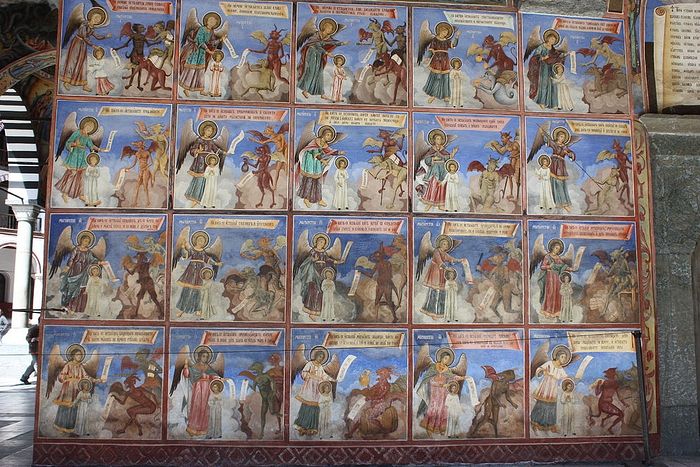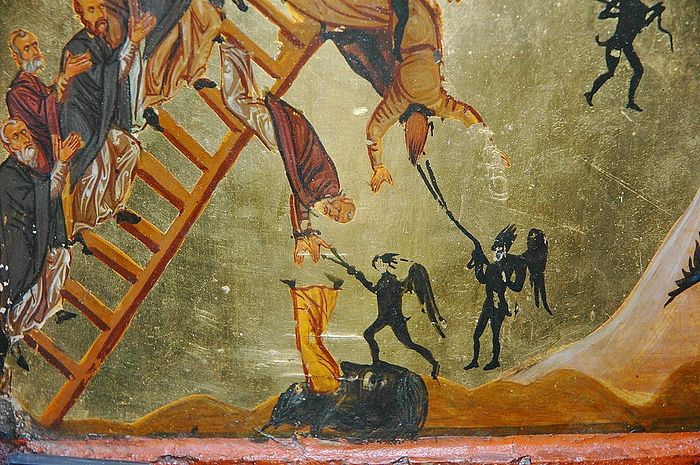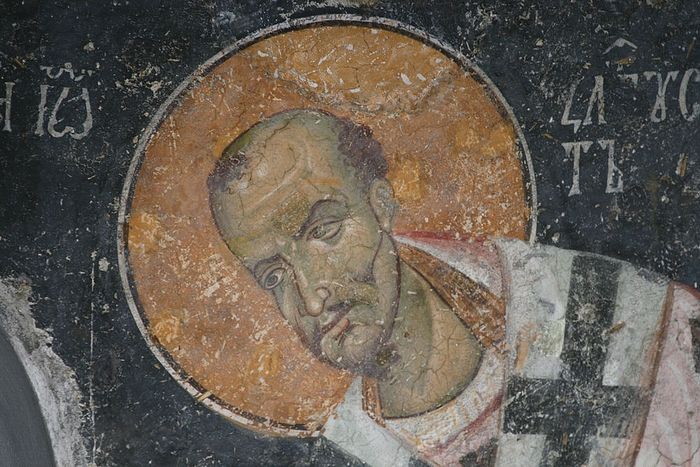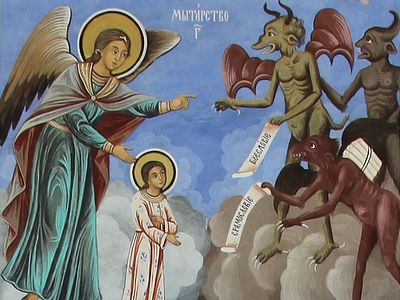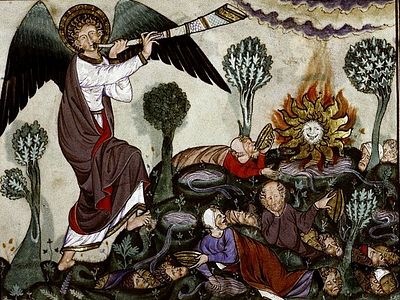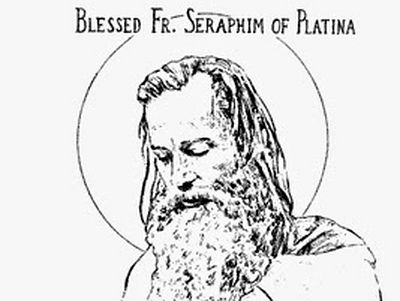See Conversation 1: What happens to the soul after death?
See Conversation 2, Part 1: The Bible on the aerial tollhouses
When the holy fathers praised the Son of God’s ascetic labor on the cross, they directed their attention to the fact that Jesus Christ died on the Cross without touching the earth; that is, between heaven and earth. And liturgically interpreting these circumstances, they say that Christ conquers the master (devil) in his own palace.
Those who have parted their bodies do not rise so easily to the heavens as the neo-Protestants and our own renovationists would have it. There is a good deal of testimony in the holy fathers about the aerial tollhouses. For example, St. Athanasius the Great, Patriarch of Alexandria, in his “Life of St. Anthony the Great” describes the following:
One day, at the beginning of the ninth hour, when the venerable one (Anthony), began to pray before taking food, he was suddenly taken up in the Spirit and carried by the angels to the heights. The aerial demons tried to prevent his ascent; the angels who argued with them demanded that they state their reasons for preventing Anthony, for he had no sins. The demons tried to expose sins he had committed from his very birth, but the angels shut the mouths of the slanderers, telling them that they should not enumerate his sins committed since his birth, which have already been blotted out by Christ’s grace. But let them present the sins—if there are any—he committed after he became a monk and dedicated himself to God. While making their accusations the demons pronounced many brazen lies; but since their slander was unfounded, a free path was opened to Anthony. He then immediately came to himself and saw that he was standing in the same place that he had stood for prayer. Forgetting all about food, he spent the entire night in tears and lamentations, pondering on the multitude of mankind’s enemies, on the struggle with such an army, and the difficult path to heaven through the air.[1]
Here St. Athanasius the Great, Patriarch of Alexandria, tells us that when our prayer is raised to God, the evil spirits under the heavens strive to stop it. Not only is the soul’s ascent to the Kingdom of Heaven complicated—like a certain hovering—but prayer itself will be complicated, as it breaks through to the Heavens only with difficulty. And if there were no helpers—the angels, and primarily our guardian angel and the saint whose name we bear—then it would be hard for us to persevere in this difficult battle.
The reason for the devil and demons’ hatred for us
The Slavonic word, mytarstvo [“tollhouses”], comes from the word mytar (Greek τελώνης; Latin publicanus). A publican is a tax collector. In a certain sense the demons play the role of certain spiritual creditors. In that part of our lives where we sin, we, voluntarily or involuntarily, have identified ourselves with them. They see a part of themselves in us, and consider that we are as if indebted to them.
On the other hand, since for the devil and the demons, who were formerly angels (created from the light of “immaterial fire”,[2] compare: Ps. 103:4), access to the heavenly mansions is completely closed, they can out of envy try to prevent us (who are made of dust) from entering. St. John Damascene wrote, “An angel is of rational nature… It is not capable of repentance, because it is bodiless. For man received repentance due to the infirmity of his body.”[3] On the other hand, their envy of man is originally conditioned upon the fact that the devil “is the angel out of these angelic powers who stood at the head of the earthly ranks, and whom God had entrusted with guarding the earth… he became proud against God Who created him, wanted to oppose Him, and was the first to fall from blessedness, finding himself in evil.”[4]
Thus, we can see several reasons for the hatred that the devil and demons have against mankind:
1. They were created from immaterial light (flames), and we were created from dust.
2. For the very reason that their nature is higher, repentance is closed to them; while for us, for the sake of our bodily infirmity, repentance is open.
3. The devil and demons lost both the Heavenly Kingdom and authority over the earth, while man, who is born on earth, can enter the Kingdom of Heaven (in the heavens).
Thus, the only way to get their revenge against us for their losing both heaven and earth is to halt us in the aerial tollhouses, in the space between heaven and earth.
When a sinner tries to pass through the tollhouses, they (the demons) try to detain what they consider their own. For God is the Source of holiness, and there is no sin in Him. But the sinner who has not purified himself for sanctity has a certain part of his life that definitely belongs to satan, the devil, and demons of all stripes. And they demand what is theirs, saying, “He is ours; he is a fornicator, a murderer, a drunkard, a slanderer, an evil-doer.” And they demand like tax collectors what they count as justly theirs.
Here a question arises: If a person is a sinner, then why doesn’t he desire what is natural for him? If he is a sinner it means that he is full of sins; it means that he has evil as a part of his life, like something welded to his nature. Why then does the soul nevertheless reach for God? Because God is his Creator. Every soul instinctively perceives God, regardless of whether he believes in Him or not, whether he’s Orthodox Christian or not, or even whether he’s a total atheist. The soul hungers and thirsts for God. In the Scripture is written: For in him we live, and move, and have our being (Acts 17:28).
There exists a connection between the Creator and the creation; any part of creation exists only because God continues to have a dialogue with it. Through Him we live, move, and exist; and if God were to cease His dialogue with any part of creation, all creation would momentarily cease to exist. Therefore the holy fathers say that even in hell, forms of mutual existence between the Creator and the creation will continue, because nothing can exist outside of God. It is written, If I go down into hades, Thou art present there… And I said: Surely darkness shall tread me down… For darkness will not be darkness with Thee, and night shall be bright as the day; as is the darkness thereof, even so shall the light thereof be (Ps. 138:8, 11-12). But the perception of God in hades can only increase the torment of the suffering sinner, suffering from the torments demanded of him by divine Love, “in the fire of his own diabolic egoism, recognizing his own sins, eaten away by fiery worms of desperation and the gnawing of conscience.”[5]
Testimony of the Eastern fathers on the tollhouses
St. Ephraim the Syrian: “When the reigning powers approach, when the terrible army comes, when the divine confiscators command the soul to move out of the body, when, drawing us out by force, they lead us to the inescapable judgment, then seeing them the wretched man… comes to a totally shaken state, as from an earthquake, and trembles all over… The divine confiscators, pulling out the soul, ascend through the air where stand the directors, authorities, and rulers of the world of enemy forces. These are our evil accusers, strange tax collectors, accountants, and tribute takers; they meet us on the way, describe, peruse, and enumerate the sins and handwriting of the whole person, the sins of youth and old age, voluntary and involuntary, committed in deed, word, and thought. There is great fear, great trembling of the poor soul, indescribable want that it then suffers from the countless multitude of dark enemies surrounding it and slandering it in order to keep it from ascending to heaven, settling into the light of the living, and stepping into the country of life. But the holy angels who have taken the soul carry it away.”[6]
St. Macarius the Great: “When the human soul leaves the body, a great mystery takes place. For if it is guilty of sins, the legions of demons, evil angels, and dark powers take this soul and drag it to their side. For if a man while still alive and in this world submitted, gave himself over, and was enslaved to them, then won’t they possess him and enslave him even more when he leaves this world? As for the other, better portion of the people, it all happens differently. That is, angels, the holy spirits, surround the holy slaves of God and protect them even in this life. And when their souls are parted from their bodies, the ranks of angels receive them into their company, into bright life, and thus lead them to the Lord.”[7]
St. Maximos the Confessor: “What man like me, defiled by the impurity of sin, is not afraid of the presence of holy angels who at God’s behest can take by force a person having to leave this life; take him wrathfully and against his will? What man who is aware of his evil deeds is not afraid to meet the cruel and merciless evil demons?”[8]
St. John Chrysostom: “There much prayer is needed, many aides, many good deeds, and great intercession from the angels while passing through the aerial spaces. If when we travel in a foreign country or city we need a guide, then how much more do we need guides and aides to lead us past the invisible rulers of the world or this air, called persecutors, publicans, and tax-collectors!...” Speaking for reposed Christian infants, Chrysostom elegizes and theologizes: “The holy angels peacefully separated us from our bodies, and we freely escaped the rulers of the air. We had reliable leaders! The evil spirits did not find what they were looking for in us, and didn’t see what they wanted to see. Seeing an undefiled body they were put to shame; they did not find wicked words in us and fell silent. We passed by and humiliated them; we passed through them and trampled them down; the net is broken, and we were delivered. Blessed is the Lord, Who has not given us a prey to their teeth! (Ps. 123:6-7). When it was finished the angels who led us rejoiced; they kissed us who were justified, and said with gladness, ‘Lambs of God! We glorify your arrival here; the ancestral paradise is open to you; the bosom of Abraham is offered to you. The right hand of the Master has received you; His voice has summoned you to His right side. He has looked upon you with well-disposed eyes; He has written you in the Book of the Living.’ And we said, ‘Lord! Righteous Judge! You have deprived us of earthly blessings—do not deprive us of the heavenly. You have taken us from our fathers and mothers—take us not from Your saints. The mark of Baptism has been preserved whole on us—we present our bodies to You pure because of our infancy.”[9]
Next: Testimony of the Western fathers of the Church on the tollhouses
